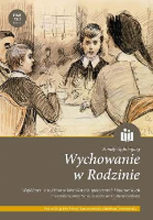Reaktywne zaburzenia więzi (RAD) u dzieci
przebywających w placówkach opiekuńczo-
-wychowawczych
Reactive Attachment Disorder (RAD) in children living
in a special childcare centres
Author(s): Liliana KOŁODZIEJCZAKSubject(s): History, Social Sciences, Education, Sociology, Social history
Published by: Zakład Historii Edukacji w Instytucie Pedagogiki Uniwersytetu Wrocławskiego
Keywords: Reactive Attachment Disorder; types of attachment; special educational centre; children rejected
Summary/Abstract: The role of parents in the upbringing of the child is especially important for a normal socialization and the successful development of the individual. But what happens when the child instead of receiving from their parents the a sense of security, respect and love, suffers extreme neglect or even abuse? And furthermore, how may the childfeel that, despite numerous sufferings, is in the end is rejected by their loved-torturers and goes to the special education centre? As a result of adverse experiences such an entity may be accompanied by Reactive Attachment Disorder. RAD is a disorder of human relationships, which prevents initiating and maintaining relationships – especially those with loved ones. RAD makes it difficult, not only for the child, but also to those seeking to establish a deep, emotional contact with the child. Employees of childcare centres trying to break the barrier put up by the child who displays increasing resistance, undisguised reluctance, and sometimes aggression. Also an adoptive family faces the problem. Fresh parents see the fault in themselves, because when faced with such complex disorders of their child they do not have the knowledge of what to do to help the child feel at ease in their company. The article will widely discuss Reactive Disorders ties with pupils care and educational institution, their causes, diagnostic criteria and symptoms.
Journal: Wychowanie w Rodzinie
- Issue Year: XIII/2016
- Issue No: 1
- Page Range: 469-485
- Page Count: 17
- Language: English, Polish

